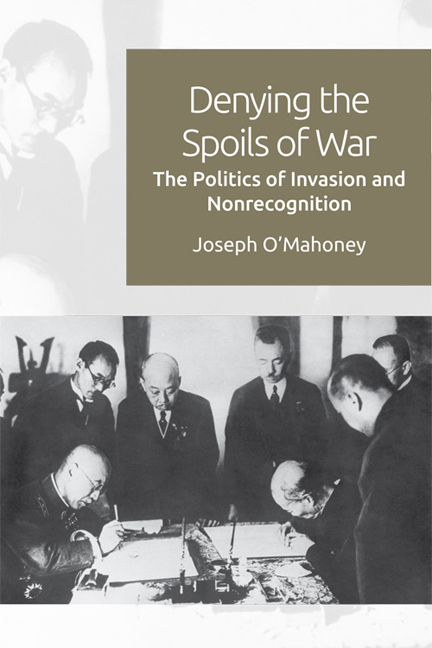Book contents
- Frontmatter
- Contents
- List of Figures and Tables
- Acknowledgements
- List of Acronyms and Abbreviations
- Introduction
- 1 Rule Maintenance: the Logic of Symbolic Sanctions
- 2 The Manchurian Crisis
- 3 The Abyssinian Crisis
- 4 Turkey, Cyprus and the Turkish Republic of Northern Cyprus
- 5 The Independence of Bangladesh
- 6 The Uncertain Fruits of Victory: Variation in Nonrecognition
- Conclusion
- Bibliography
- Index
5 - The Independence of Bangladesh
- Frontmatter
- Contents
- List of Figures and Tables
- Acknowledgements
- List of Acronyms and Abbreviations
- Introduction
- 1 Rule Maintenance: the Logic of Symbolic Sanctions
- 2 The Manchurian Crisis
- 3 The Abyssinian Crisis
- 4 Turkey, Cyprus and the Turkish Republic of Northern Cyprus
- 5 The Independence of Bangladesh
- 6 The Uncertain Fruits of Victory: Variation in Nonrecognition
- Conclusion
- Bibliography
- Index
Summary
INTRODUTION
In this chapter, I analyse the crisis surrounding the Indian invasion of East Pakistan in 1971 and the subsequent recognition of East Pakistan as the new state of Bangladesh in 1972. Certain important features of this crisis are the same as other cases. One state used premeditated military force against the army of a neighbouring state. The victorious invader then occupied a portion of the territory of the neighbouring state and supported the creation of an alternative government recognising it as ruling a new state. This description could be used of the Japanese invasion of Manchuria and the Turkish invasion of Cyprus. However, in the Bangladesh case, the new state was recognised by most states and eventually the UN accepted Bangladesh as a member nation.
The primary question for this case is why actors felt that recognition of Bangladesh would not entail the unravelling of the norm of nonaggression. Even though India's use of force did achieve the political goals of her leadership, including the dissolution of her primary rival as well as the return of millions of refugees to Bangladesh, other actors did not collectively condemn India. They also did not refuse to accord legitimacy and legality to the results of that use of force. In this chapter I analyse the actions and statements of key decision makers to find out what they were doing, thinking and saying about the recognition of Bangladesh.
HISTORICAL OVERVIEW
In 1970, Pakistan was slated to hold its first democratic elections since independence from Britain and partition from India in 1947. The elections were delayed due to a devastating cyclone in East Pakistan in November, but were held in December 1970. West Pakistan, the traditional seat of political power, was dominated by Zulfikar Ali Bhutto's Pakistan Peoples Party, who won 81 of 138 parliamentary seats in the western region (out of a national total of 307). However, East Pakistan overwhelmingly favoured Awami League candidates: 167 of 169 eastern seats were taken by Sheikh Mujib-ur Rahman's Bengali nationalist party. The Awami League technically had a majority of seats in the parliament, but they were prevented from forming a government by existing ruler President General Yahya Khan, who also controlled the military, in collusion with Bhutto.
- Type
- Chapter
- Information
- Denying the Spoils of WarThe Politics of Invasion and Nonrecognition, pp. 147 - 180Publisher: Edinburgh University PressPrint publication year: 2018



